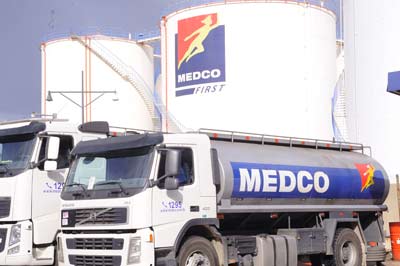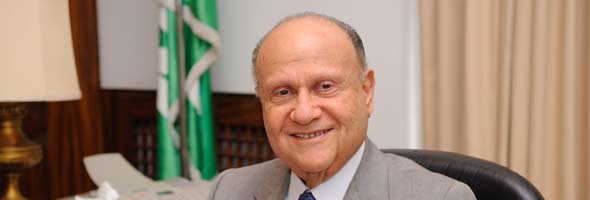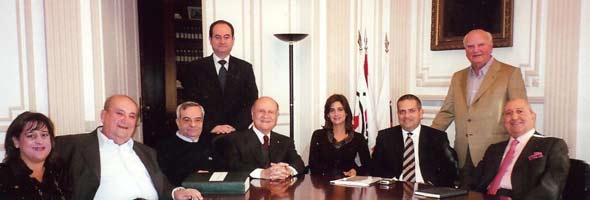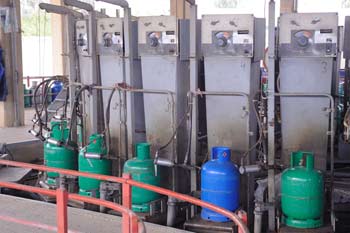Petroleum Services in Lebanon
Lebanon Privatization, Vice Chairman of MEDCO s.a.l. and Chairman of Phoenicia Oil Company s.a.l., Nicolas G. Chammas
We are the first group in the country to diversify in such a way that we are composed of fourteen completely separate companies that fall under one management group.
In 2009 we have seen high fluctuation of oil prices. In your opinion how do you see the future revolution of oil prices?
Oil prices depend on many factors. For instance if things are calm around the world the oil prices will remain stable. In actuality oil prices are very volatile for many reasons due to the international political situation in the world.
If things are calm the prices should
not exceed over 80 dollars per barrel
and I hope that things will stay this
way without interruption.
How do you assess the role of oil on the Lebanese economy and where does Lebanon get its oil?
There are two refineries in Lebanon. One is in Tripoli and one in Sidon are out of order and we cannot depend on these refineries for consumption in Lebanon. All imports come from Europe, Russia, and also jet fuel is coming in from refineries in Bahrain, Saudi Arabia. France, Italy, Spain, Turkey also provide oil to Lebanon.
The Lebanese economy grew 8.5% in 2008 and 9% in 2009 despite the global economic conditions. The World Bank estimated GDP growth in 2010 to be 7%. What are the key drivers of this remarkable growth and what is the outlook for 2010?
The growth of the market in Lebanon is due to the good economic conditions that have been present in 2009-2010 and it will continue to grow. There is relatively good demand because the industry in country is working and depending on fuel from abroad for power plants and these operate day and night due to the demand for power. Because they operate on fuel oil the consumption of oil is not going to decrease in Lebanon as long as the current situation continues. If the political situation is the same and stable the demand will increase. Lebanon also has gold reserves that make the economy’s growth impressive and the central bank has played an important role in this as well. Lebanese currency is considered strong because the actual policy of the country has been very wise and the gold reserves in country are highly valued. The central bank is very well managed by Mr. Salameh and he is very cautious and that is why in 2008 we were spared despite the world going through a financial crisis. The banks in Lebanon were very careful due to the excellent leadership at the central bank and the preservation of gold reserves played a large role in that success.
As a private sector company how do you describe your relation with the public sector?
We have an excellent relationship with the government and we are communicating openly with the different ministers on how to proceed with oil and business in the country. For instance there is APIC (Association of Petroleum Importing Companies) and we are a member of this association. The president of APIC is very careful in addressing the essential factors needed for continuity of the market.
The Chammas Group is one of the largest privately held companies in the Near East. As a privately held company you are not obliged to disclose financials but what are some of the key figures of the group?
In 2010 we are celebrating our 100th anniversary. We are proud of the multiple innovations we have introduced to the Lebanese Market that positioned us as the first national oil company, 100% privately owned by the Chammas family. To name but a few innovations, we have introduced in the early 90s, the 1st convenience stores in our stations-open 24/7, the 1st fuel management solution smart card based credit and loyalty cards branded Liters Plus and serving 65% of the corporate fleet market, the 1st proprietary loyalty programs to our customers and 38 NGO’s to help the community we evolve in. We are also the first national oil company to deliver jet fuel at airports throughout the world, namely at Hariri-Beirut International Airport. Further, we introduced the flow meters into Lebanon, vitamin asphalt in bulk and deliver a heated sea line in the Mediterranean sea to receive tankers are 160 degrees centigrade. There are many things that we have done as a company, first.

Throughout the duration of our lifetime as a company we have been very careful and we did not deviate from this just to turn a profit. We look very carefully at the quality and our performance with our customers and for this reason we have kept a good name as a company and done well throughout less than ideal economic situations. Our customers are confident in the product that we deliver and they are sure it is a quality controlled product with satisfactory pricing.
How would you describe your strategy for development?
Our strategy for development first aims at nurturing the Trust and loyalty of our customers in our quality of products and services. Our brand and the history, tradition and heritage behind that brand are very important to us and we are keen to continue developing this in order to best serve our customers. We follow recent developments in the industry in order to stay abreast of industry developments so we can remain competitive trend-setters and satisfy our client base. We have launched this year an Energy Efficiency program with the UNDP to save energy consumed by household and introduce solar energy. We have been expanding our network to solidify our downstream growth and opened 4 new stations during first quarter of 2010, and building 3 new company operated and run stations simultaneously in key locations. Moreover, we have uplifted our brand image twice in the past 20 years to reflect the dynamism of the brand and the energy behind it. We also build key-in-hand service stations for third parties with or without management and maintenance according to their request. Our strategy for development can be resumed in one word: “first” in every activity we will provide the market.

What makes you unique among your competitors?
Innovations. We believe that we are developing constantly new products and services to anticipate customers’ expectations. This ties an exceptional relationship with our customers by time and time again providing the best product to serve their respective industries. We always are looking into the future to ensure we can deliver the best and I think this makes us stand out. We have a lot of control over our products in their logistical chain and we use our own materials, services, and resources to deliver these to our network by ourselves using our own personnel even. In doing this we have a great advantage over our competitors because I don’t believe any of our competitors have as great of control over their product as we do.
How would you describe your major challenge?
Oil price’s will always be a concern
but I believe in the future we should
not expect a shortage of oil due to
new technology being developed
in the industry.
Can you tell us more about your latest projects and programs aimed towards your clients and in what areas are your currently active?
We have a faithful customer base and we should be able to continue to support them and we could even do this financially to keep them on their feet.
The Chammas Group has numerous associations like joint ventures, representations, and partnerships with blue chip companies, among others. What is your message to them to establish representation in Lebanon and what message to you have to other prospective companies who may enter a joint venture with you?

We are the first group in the country to diversify in such a way that we are composed of fourteen completely separate companies that fall under one management group. We are in oil, transportation, we have a fleet of tankers, and cement factories, for example, and at the same time we have been contractors. With that, are always open to examine new opportunities to work with large companies in order to expand the breadth of our business capacities. If a positive opportunity presents its self we would be more than willing to explore the possibilities with other companies in a joint venture, for example, and we are open to developing in different sectors.
What message would you like to give regarding Lebanon?
Despite all adverse conditions, Lebanon has always been an excellent country for the people who are in need of normal, honest business. The market in Lebanon has always been open to foreigners from all corners of the world. Lebanon is a multinational company and the Lebanese people are worldly and educated in business. Lebanese workmanship is among the best in the world and the Lebanese people know how to respect the laws and regulation in the countries where they work.